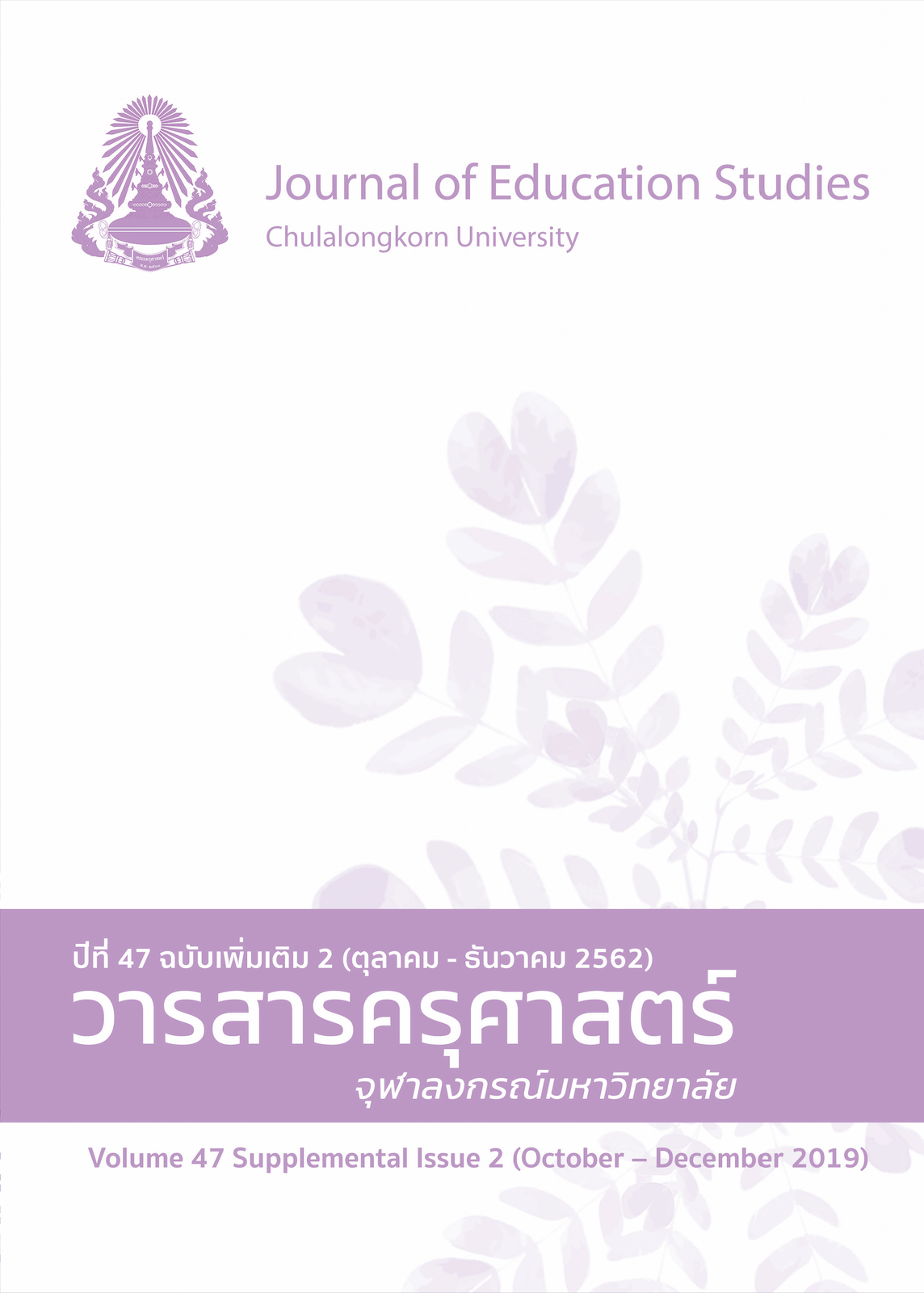Development of Learning Outcomes by Creating a Learning Environment Based on Working in Real Conditions
Keywords:
LEARNING ENVIRONMENT, LEARNING OUTCOMES, WORK INTEGRATED LEARNINGAbstract
he objectives of this study were 1) to study and create learning environments for working in real conditions, and 2) to compare learning outcomes before and after implementation. The sample groups in this study consisted of 20 students of high vocational certificate level and 20 industrial supervisors, 16 students at the Bachelor’s degree level and 16 industrial supervisors in six workplaces. Research tools were comprised of learning outcomes and environment system. Data analysis consisted of mean, standard deviation and t-test for comparing learning outcomes before and after implementation.
Research Results
- 1. The learning environment system for working in real conditions was based on 6 elements consisting of 1) preparation, 2) learning and teaching in real conditions, 3) consultation, 4) development from learning outcomes arrangement, 5) management of assessment and continuous improvement and 6) learning outcomes from working step. The assessment of the learning environment was satisfactory at a strong level.
- 2. The results of comparing the score level average of the learning outcomes before and after implementation for working in real conditions found that learning outcomes after implementation were higher than before implementation at a .01 significant level.
References
เครือข่ายพัฒนาสหกิจศึกษาภาคใต้ตอนบน. (2561). คู่มือการจัดการเรียนการสอนเชิงบูรณาการกับการทำงาน (ฉบับสมบูรณ์). นครศรีธรรมราช: มหาวิทยาลัยวลัยลักษณ์.
ทิศนา แขมมณี. (2555). ศาสตร์การสอน: องค์ความรู้เพื่อการจัดกระบวนการเรียนรู้ที่มีประสิทธิภาพ. กรุงเทพมหานคร: สำนักพิมพ์แห่งจุฬาลงกรณ์มหาวิทยาลัย.
ประกาศกระทรวงศึกษาธิการ เรื่อง เกณฑ์มาตรฐานหลักสูตรระดับปริญญาตรี พ.ศ. 2558. (2558, 13 พฤศจิกายน). ราชกิจจนุเบกษา. เล่ม 132 ตอนพิเศษ 295 ง. หน้า 2-11.
ประกาศ เรื่อง ยุทธศาสตร์ชาติ (พ.ศ. 2561 - 2580). (2561, 13 ตุลาคม). ราชกิจจานุเบกษา. เล่ม 135 ตอนที่ 82 ก. หน้า 1-71.
ปริญญา เทวานฤมิตรกุล. (2558). การศึกษาที่มุ่งผลลัพธ์ (Outcome-based education) โดยผู้เรียนเป็นศูนย์กลาง (Student-centered) และใช้โครงงานเป็นฐานในการเรียนรู้ (Project-based Learning). เอกสารประกอบการบรรยายเรื่อง “Active-based learning : What, why and how? และเรื่อง “Workshop : How to implement active-based learning in your classroom?”. วันพุธที่ 1 เมษายน 2558 มหาวิทยาลัยเชียงใหม่.
สำนักงานคณะกรรมการพัฒนาการเศรษฐกิจและสังคมแห่งชาติ. (2559). แผนพัฒนาเศรษฐกิจและสังคมแห่งชาติ ฉบับที่สิบสอง พ.ศ. 2560-2564. กรุงเทพมหานคร: สำนักนายกรัฐมนตรี.
อลงกต ยะไวทย์. (2560ก). แนวทางการจัดการศึกษาเชิงบูรณาการกับการทำงานระดับอุดมศึกษาของประเทศไทย. สำนักงานคณะกรรมการการอุดมศึกษา (สกอ.): เครือข่ายพัฒนาสหกิจศึกษาภาคใต้ตอนบน.
อลงกต ยะไวทย์. (2560ข). กลยุทธ์และแนวทางการขับเคลื่อนการจัดการศึกษาเชิงบูรณาการกับการทำงาน เพื่อยกระดับการมีงานทำของบัณฑิตไทยในศตวรรษที่ 21. กรุงเทพมหานคร: สำนักงานคณะกรรมการการอุดมศึกษา (สกอ.).
ภาษาอังกฤษ
Brew, L., & Kottler, J. A. (2007). Applied helping skills: Transforming lives. Thousand Oaks, CA: Sage Publications.
Gordon, Rick. (1998). A curriculum for authentic learning. The Education Digest, 63(1), 4-8.
Kolb, D. A. (1984). Experiential learning. Englewood Cliffs: Prentice-Hall.
Kolb, A. Y., & Kolb, D. A. (2005). Learning styles and learning spaces: Enhancing experiential learning in higher education. Academy of Management Learning & Education, 4(2), 193-212.
Kramer, M., & Usher, A. (2011). Work-integrated learning and career-ready students: Examining the evidence. Toronto: Higher Education Strategy Associates.
Linford, D., & Marshall, J. (2014). Mentorship from the student perspective. The Practicing Midwife, 17(11), 33-36.
Northeastern University. (2012). Cooperative Education. Retrieved from http://www.northeastern.edu/experiential-learning/cooperative-education
Stirling, A., Kerr, G., Banwell, J., MacPherson, E., & Heron, A. (2016). A practical guide for work-integrated learning: Effective practices: Effective practices to enhance the educational quality of structured work experiences offered through colleges and universities. Ontario, Canada: Higher Education Quality Council of Ontario.
Swinburne University of Technology. (2012). Industry engaged learning: Industry-based learning. Retrieved from http://www.swinburne.edu.au/iel/programs/ibl
University of Waterloo. (2012). What is co-operative (co-op) education. Retrieved from https://uwaterloo.ca/co-operative-education/about-co-operative-education




